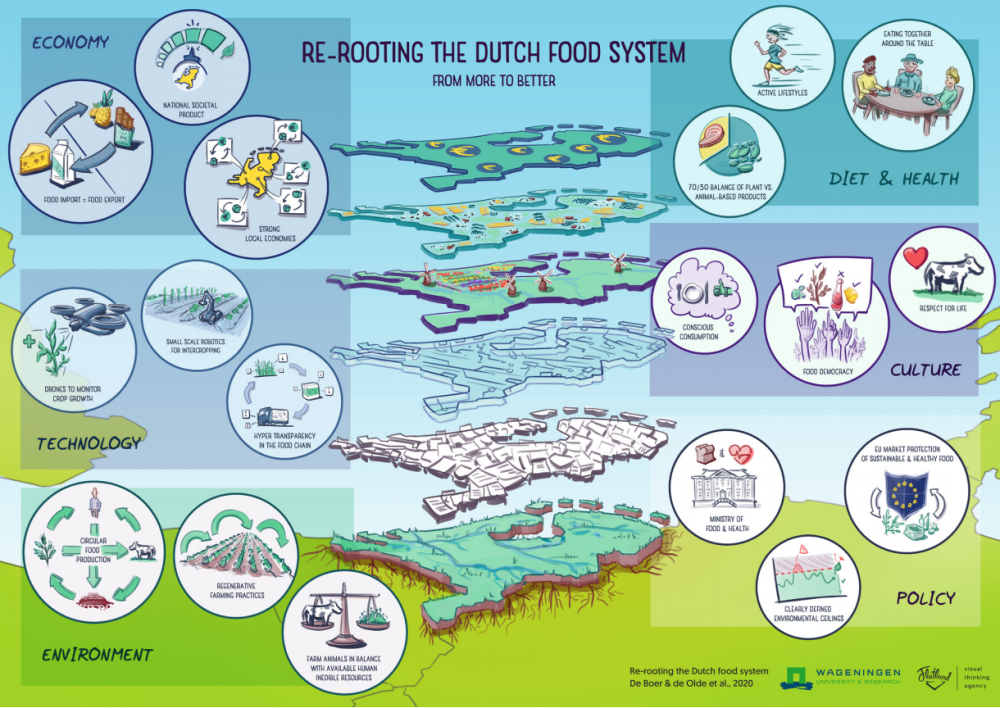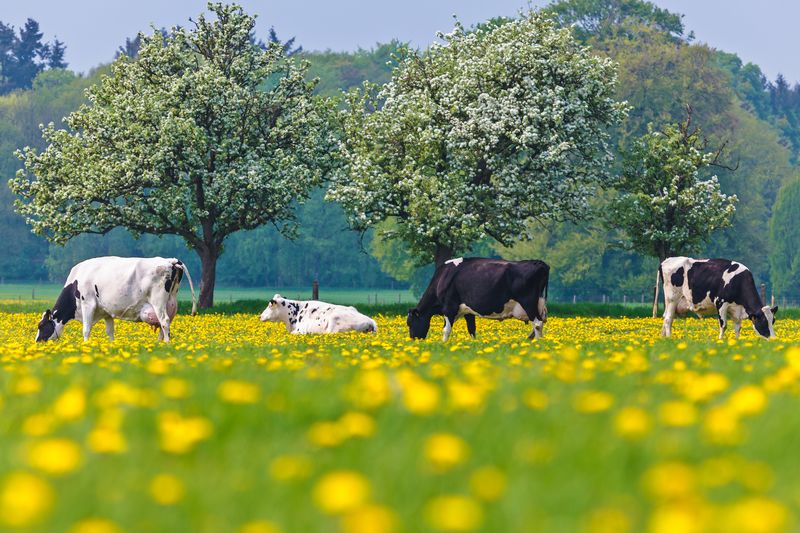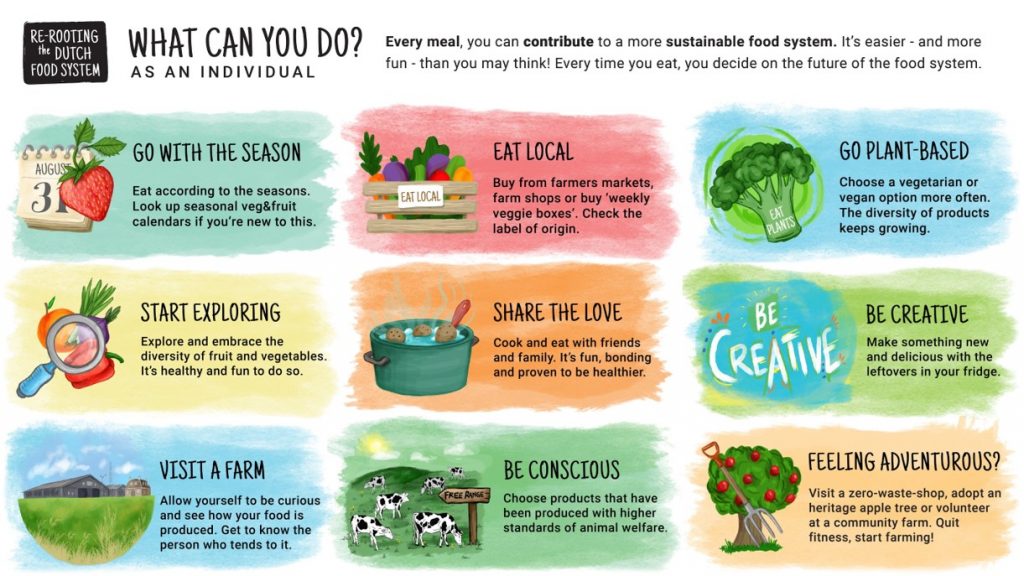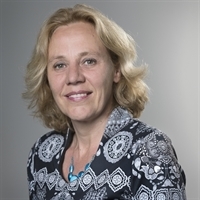Voting with your fork: a healthy and sustainable food system for the Netherlands
Together we can achieve a healthy and sustainable food system that respects people, animals and the earth. Researchers of Wageningen University & Research are cooperating with farmers and environmental organisations to provide a glimpse of what the Dutch food system could look like in 2050. In this system, farmers will only grow crops for human consumption, and livestock will only eat waste streams and grass. Citizens will also be actively involved, for example in ‘food councils’. Consumers can start on this path today by eating more locally produced and plant-based food. Are you already voting with your fork?
In the Netherlands in 2050 we will eat more plant-based food products and children will get food classes in school. Food waste will be a thing of the past and there will be a dedicated Minister of Food. Advertisements for unhealthy snacks will be prohibited and smart WCs will separate our urine and faeces so that the nutrients can be reused in agriculture. Arable farmers will only grow crops for human consumption and their fields will contain mixed crops. Livestock will feed only on beet leaves, other crop residues and grass. Cows, pigs and chickens will graze, root and scratch outside to their hearts’ content.
Is this a utopian vision? Not according to Imke de Boer, Professor of Animal Production Systems, and Evelien Olde, who works in De Boer’s research group. They cooperated with innovative farmers and environmental and nature organisations to develop a vision of the food system in 2050. Their vision won them a place among ten finalists for the ‘Food System Vision Prize’ of the American Rockefeller Foundation. Only 79 of the 1317 participants made it to the semi-finals of this competition. De Boer’s team will hear in early January if they can present their plan at the United Nations World Food Summit in September 2021.
Pioneers
“Our plan is a holistic vision of the future, in which farmers, the food processing industry, consumers, the government, supermarkets, financiers, suppliers and nature and environmental organisations all contribute to this necessary transition,” explains De Boer. The involved farmers are already putting parts of the food vision into practice and their cooperation is an essential part of the vision, De Boer emphasises. “I am a scientist and I study food systems, but they are the pioneers who are showing us that it is really possible to produce food differently.”
“It is very important that people understand how much effort and energy it takes to produce food and what the real value of this food is.”
The capacity of the earth
The food system causes about a quarter of all global greenhouse gas emissions, a third of acidification, and most of the eutrophication and loss of biodiversity. Furthermore, about 40% of the earth’s usable land surface (i.e. not covered with ice or desert) and 70% of all fresh water is used for food production. It boggles the mind that at the same time an increasing number of people in the world suffer from obesity and related metabolic diseases such as type 2 diabetes, while elsewhere hunger and malnutrition still occur on a large scale.
Planet and consumer
“We took the limits of the planet – i.e. the ‘environmental operating space’ – as our starting point. But of equal importance is the social foundation, which is based on the rights of humans and other animals, such as good working and living conditions,” explains De Boer. The role of consumers is strikingly important in this food vision. “It is very important that people understand how much effort and energy it takes to produce food and what the real value of this food is.”

Involved citizens
In 2050, many citizens will be active in producer and consumer food councils and they will grow their own food in communal allotments or their own gardens. “When people grow their own vegetables in the garden or herbs on their balconies, they get a better idea of what it takes to produce food,” explains De Boer. Farm stores where people can buy local products such as cheese and vegetables can help to strengthen the connection between consumers and their food. To teach children where their food comes from, food education will be part of the standard curriculum at school, with food lessons and trips to local farms, for example.
Drones and mixed cropping
The farm will look different in 2050 than it does now. It all starts with healthy soil and clean water, explains De Boer. “For example, where currently monocultures are grown on the fields of Flevoland, in our plan the farmers will grow mixed crops.” Strip and mosaic cropping systems will ensure more efficient use of nutrients and water, reducing the need for artificial fertilizers and crop protection products, while agricultural robots and drones will also help to significantly reduce their use.
More plant-based food
The crops grown by farmers will only be for human consumption and no longer used for animal feed. “Currently, about 40% of the fields in the Netherlands and the rest of the world are used for the cultivation of fodder, such as grains and maize for poultry and cattle. We can make much better use of that land by growing food for people on it,” says De Boer. Animals will eat only crop residues such as beet leaves, other waste streams from the food industry, and grass.

Circular production
This does mean that people will need to eat fewer animal products such as meat and dairy. “We need to eat more plant-based foods. Besides, they are healthier as well.” continues De Boer. However, this does not mean that all livestock has to go and that we will not consume any meat and dairy at all. “Animals can convert agricultural waste streams and grasslands that are not suitable for arable crops into high-quality food products in the form of animal proteins.” This is a form of circular agriculture, where the agricultural and ecological conditions of an area determine the number of animals that can be farmed and whereby animal welfare is an important factor.
Fair
In this food vision, by 2050 the Netherlands will no longer be the second-largest exporter of agricultural products. Products that we produce ourselves – such as dairy, potatoes, carrots, leeks and onions – we will also consume ourselves. “It was very strange that, during the first corona wave, our supermarkets were stocking potatoes from Israel while our own farmers were unable to sell theirs,” remarks De Boer.
“We currently import a huge amount of our food. This places huge demands on land and water supplies elsewhere and can also affect local food security. Nevertheless, we cannot produce everything in the Netherlands. Coffee or citrus fruits can better be imported from other countries, but for a fair price.”
Land managers
The same fair trade principle will apply to food we produce ourselves in 2050. The role of the farmer will shift from producing as much and as cheaply as possible to being part of a sustainable and healthy production system. Farmers will manage the land with skill and in harmony with the environment, soil life and biodiversity such as insects and grassland birds, and with respect for animal welfare. This will also earn them a good living.
“Food today is often too cheap because external environmental or social costs are not included in the price,” says De Boer. “This is why we need to shift from ‘gross national product’ to ‘gross societal product’, with a focus on the conservation of natural resources and human and animal rights.” The economy will no longer determine production, but rather serve it.
Voorbeelden
In the Netherlands, there are already many different initiatives by farmers and consumers to that give shape to the transition to sustainable and healthy food production and consumption. One example is Kipster, where the chickens that lay the eggs are only fed waste flows. Another initiative is Herenboeren, where consumers have joined forces to determine what they eat and how it is produced. The food is distributed directly among the members without the intervention of traders or retailers and the consumer knows exactly where their food comes from.”
Learn more about these initiatives in the video below:
Locally grown food
The authors of the food vision are committed to the transition of the food system. “We want to see Dutch people purchasing more locally-grown food and we will challenge supermarkets to help us achieve this. We will also encourage the education sector to introduce food classes and ask the government to set clear limits on the use of environmental space,” says De Boer. Major companies and organisations such as Unilever, the World Wildlife Fund, the Netherlands Society for the Protection of Birds and the Dutch Society for the Protection of Animals are supporting these efforts.
It is also essential to win the cooperation of the government. De Boer emphasises the importance of a consistent and long-term vision for farmers. “Agricultural policy currently stumbles from one crisis to the next. The solution is to develop sustainable and long-term policy.”
Encouraging farmers
The prize money of $150,000 that De Boer and her colleague Evelien de Olde received from the Rockefeller Foundation – which may be supplemented with another $50,000 in early January – will go to the farmers’ organisations that are cooperating in the food vision. “The three organisations represent about a thousand farmers who are very motivated to help change our food system,” says De Boer.
De Boer received many positive responses to the food vision, including from farmers. “Many farmers say they are prepared to change, but that they don’t know how. If you provide them with encouragement and support to change their business models you will eventually generate the momentum needed to make the transition happen.”
Make a difference on your plate
The consumer also has a key role to play by buying and consuming more local products, using leftovers and not wasting food, eating less meat and instead trying plant-based products such as dairy and meat substitutes. People should also eat together more often because that encourages them to cook healthier meals, recommends De Boer. “These are all things you can do yourself, every day. Vote with your fork!”

Read more:
- More about the food vision
- Longread about the food vision
- Winning the Rockefeller Foundation Prize
- Imke de Boer on the food vision for 2050
- Lecture: Do animals have a role in future food systems?
- Read this article in Dutch


Hello Professor,I am a master student and will graduate in 2021.I am very interested in the food system such as eat local and eat seasonally. May I ask a question that if you will accept PhD student in Wageningen University & Research in the coming semester?If you need more information about me please tell me . Thank you very much.
Dear Penny,
We continuously have vacancies for new PhD students, they are always advertised via Academic Transfer. So if you are interested, keep an eye on Academic Transfer.
Best regards,
Imke